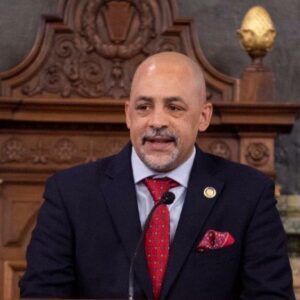What’s the maximum amount for a minimum wage that makes economic sense? It depends on your perspective, Delaware Valley business owners say.
The Democrat-controlled Pennsylvania House passed a bill raising the minimum wage from the federally mandated $7.25 to $15 by 2026. Of more concern for restaurant owners is that it would also raise the minimum wage for tipped workers to $9 an hour, up from $2.83.
During a Zoom Town Hall Tuesday with self-declared “fair wage” advocates, Philadelphia Democrat Rep. Chris Rabb said $15 is not enough, and he wants the minimum wage to reach $21 an hour.
“Because $15 ain’t enough. Not in Philly,” Rabb said at a campaign event last year.
“Does Rabb want to pay my payroll?” asked Tom Thornton, owner of J.D. McGillicuddy’s in Haverford. Most workers are already making $15 an hour, but “$21 is an overshoot,” said Thornton. “People do need to start out in the $15 to $20 range until they become worthy of $21 an hour. To be perfectly honest, because of all the moving parts in a kitchen or restaurant or any type of business — new employees need training.”
“But the point is [the state legislature] can’t keep gouging people,” said Thornton. “$15 is more than fair; $21 is too high.”
While the $7.25 minimum wage may sound low, less than one percent of the state’s workforce earns the minimum. About 70 percent of Keystone State workers earn $15 or more already, and the average hourly wage in Pennsylvania as of 2022 was $29.88, according to federal Bureau of Labor Statistics (BLS) data.
Chris Todd, who owns Christopher’s, a restaurant in Wayne, said, “We have no problem with $15 an hour.” His tipped employees make more than that. “If you’re good, you make a lot more money than people think.”
In 2022, according to the BLS, the average person waiting tables earned about $16 an hour, with the top ten percent taking in more than $26 an hour.
“Pay your people well, and they stay with you,” Todd said. But “$21 an hour is pretty steep.”
During Tuesday’s Zoom call, Rabb bemoaned the House’s $15 legislation, saying it didn’t go far enough.
“The reason we have passed a minimum wage bill to a lowly $15 an hour is because the Senate is controlled by right-wingers who don’t even probably believe we should have any minimum wage at all. So, the strategy behind passing this watered-down minimum wage bill is to start there. But the problem is how the Democrats’ approach was based on logic, and that didn’t really fly in the Senate. So it didn’t matter that we took a bill that was identical to a Republican’s proposal. It was ignored. But we need to start strong, with as strong as possible legislation.”
Rep. Malcolm Kenyatta (D-Philadelphia), who’s also running for state auditor general, was also on the call, urging higher mandated wages. Kenyatta said he grew up in a “working poor” family and started working at 13 years old washing dishes in a restaurant. He continued to work in restaurants through college, “having to figure out how to survive on tips.”
He added when it raises the minimum wage, the legislature needs to be careful not to push people off the “benefits cliff” because when their salaries go up, they may no longer qualify for tax or housing support.
Kenyatta and Rabb were joined by Lt. Gov. Austin Davis, who said he and Gov. Josh Shapiro (D) support increasing the minimum wage to $15 an hour.
“All work has value,” said Davis. “There is dignity in a hard day’s work whether you’re busing tables or driving a bus. Pennsylvania workers don’t want handouts. And frankly, the governor and I don’t want to give them a handout. We want to give workers a hand up and create an opportunity economy that gives everyone the shot to succeed and to live here in Pennsylvania. We want all Pennsylvania workers to have the opportunity to earn a fair wage.”
Despite Rabb’s comments about his Senate counterparts, Senate Majority Leader Joe Pittman (R-Armstrong) said during remarks about the budget that the Republicans are willing to work on a deal regarding a higher minimum wage. However, he also added a note of economic caution: higher wages could lead to higher inflation.
“The Independent Fiscal Office pointed out that 60 percent of any minimum wage increase automatically goes into the cost of goods and services. And so, when you talk about inflationary times when you bring the minimum wage up, it also drives into inflationary products.”
Also, nonprofit agencies, like YMCAs, “that rely on part-time work, often times college students to come in and provide services to the community. They don’t have the ability to pass on the increased costs for those services. They either have to raise more in the community, or they have to reduce services,” he said.
Still, Pittman added, “We think we can get somewhere on minimum wage. But I also know we have issues such as permitting reform, clearing red tape, tax reform…”
Higher wages could also lead to fewer workers. In California, where the minimum wage for fast-food workers is headed to $20 an hour in April, The Wall Street Journal reports some chains, like Burger King, will be installing more digital ordering kiosks to soften the economic blow.
“These state leaders and the leadership out there have no concept of what real money is about,” said Thornton. “They have no concept about the little guy, the small businesses that are trying to put people into the workforce, and you just can’t gouge them at $21 an hour.
“Businesses will close left and right. These people who make the rules have no clue. They’ve never run a business themselves.”

